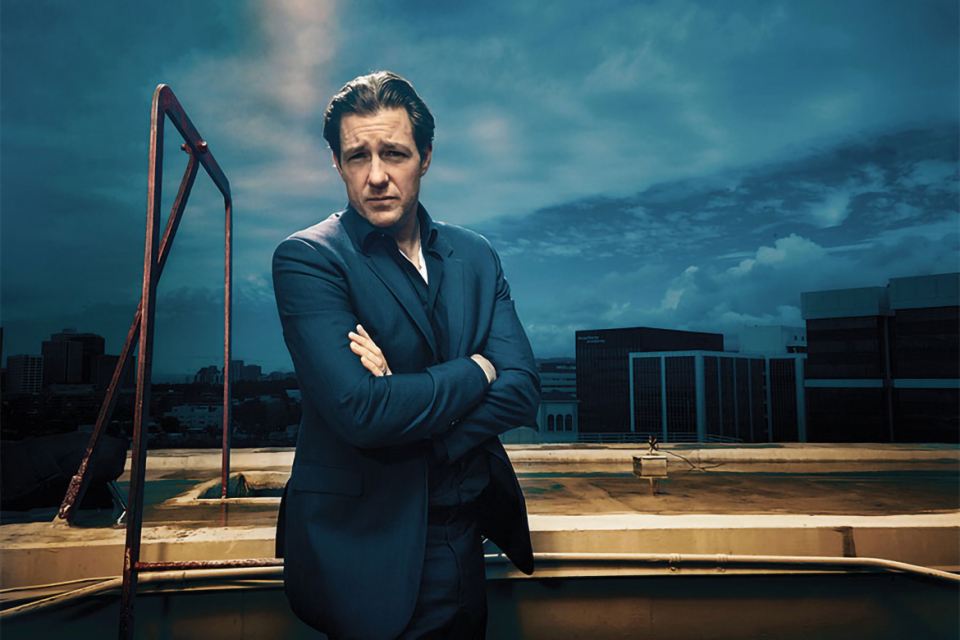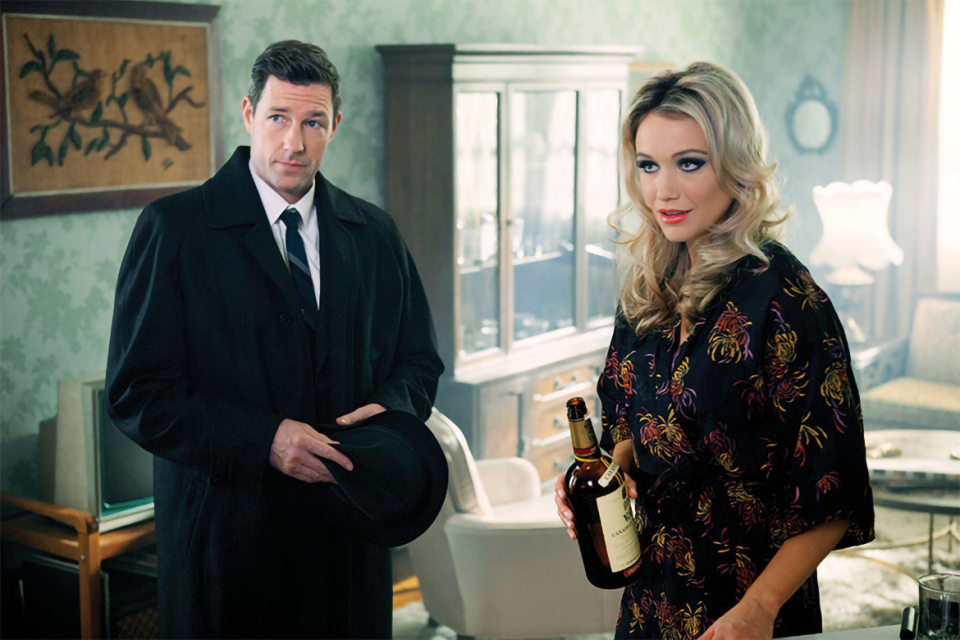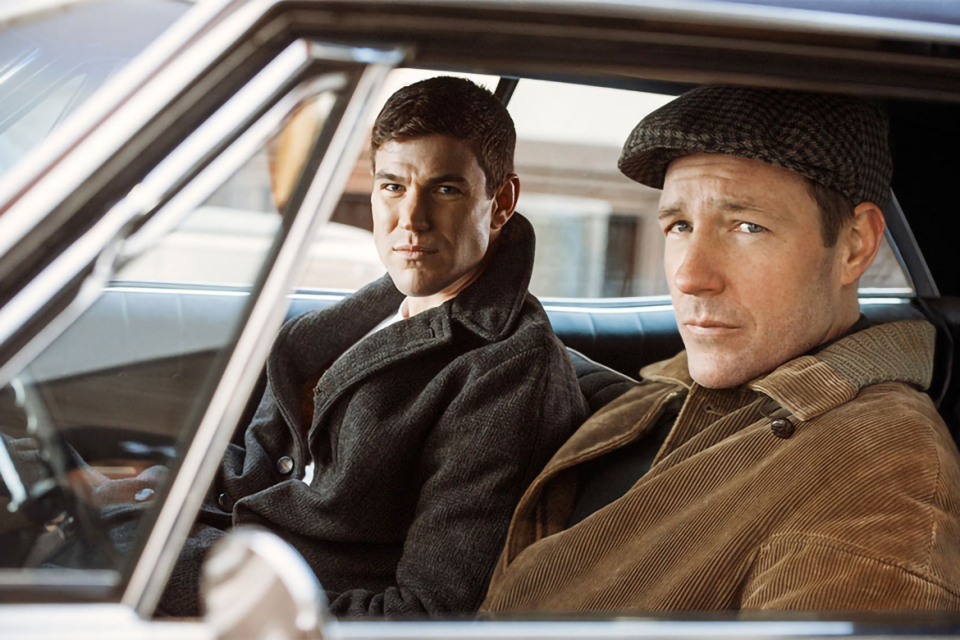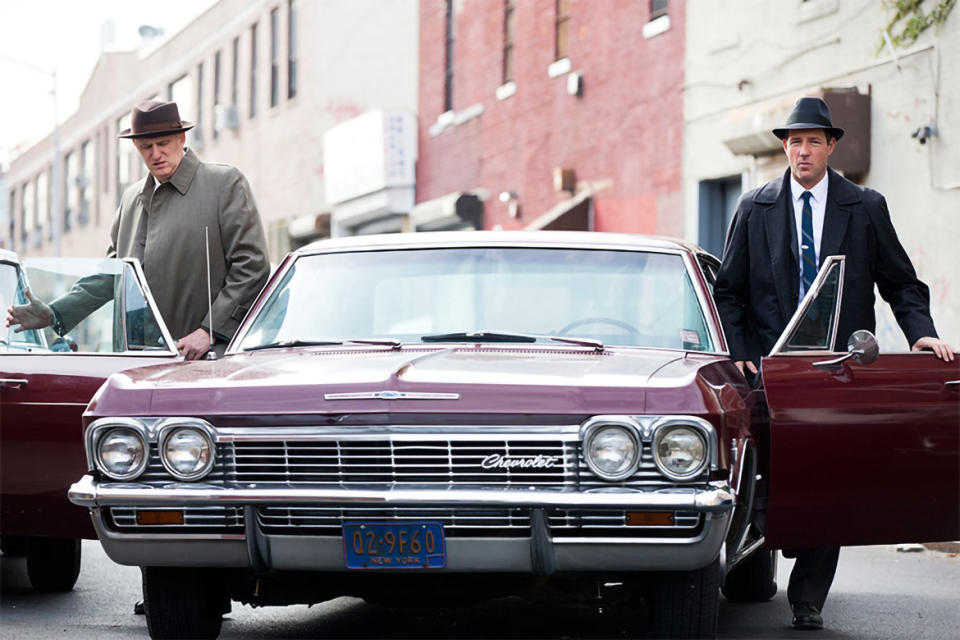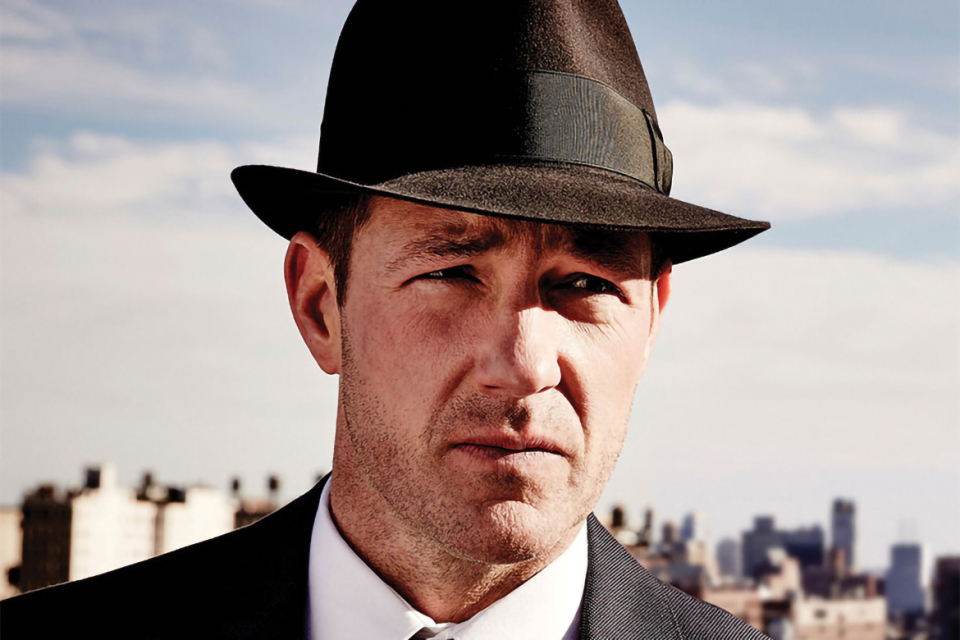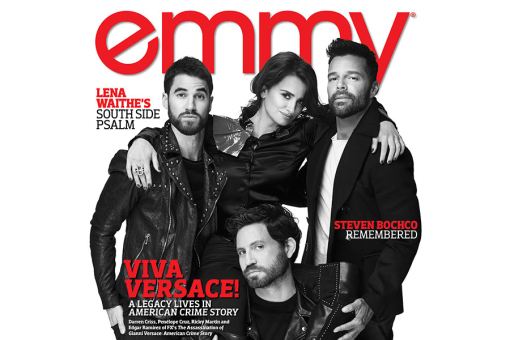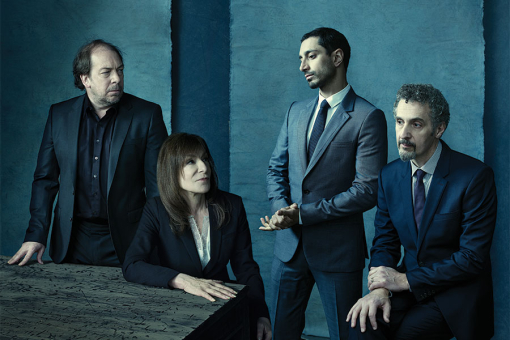Neatly stacked on a bookshelf in Ed Burns’s office in New York’s Tribeca neighborhood are some 20 unproduced film scripts he has written over the past two decades.
Buried within the trove of feature dramas with titles like Stoolie and Legs lies the multi-generational Irish-American Godfather-type saga On the Job, which he wrote in 1997 while starring in Steven Spielberg’s Saving Private Ryan.
It would be easy to miss these scripts within the room, part of a ninth-floor suite overlooking lower Manhattan. The eye naturally gravitates a few feet higher to a display of Burns’s stunning family, including photos of his wife, model Christy Turlington, snuggling their babies Grace and Finn, now eleven and eight, respectively.
But rather than sidestep the mountain of rejection that reflects the increasingly rigid studio-film marketplace, Burns is eager to introduce his other offspring.
“It’s another film we couldn’t get made,” says Burns, pointing to the Hell’s Kitchen gangster tale Stoolie. “That was the one point in my career where I was really tempted to throw in the towel because I thought I had a really great script, put together a great cast, but couldn’t get $2 million for it.”
But from futility sprang opportunity. All of these scripts, particularly On the Job, serve as the foundation for his TNT series, Public Morals, which begins its 10-episode first season August 25.
The story is set in the early 1960s and revolves around two Irish‑American families in Hell’s Kitchen, the Manhattan neighborhood once known for its tough rep and the poor Irish, Scottish and German immigrants who settled there in the mid–19th century.
In Public Morals, the Muldoons are the cops, and the Pattons are the gangsters. The title refers to New York City’s Public Morals Division, which investigates vice crimes; Burns plays Officer Terry Muldoon, and Michael Rapaport plays Charlie Bullman, his partner.
In 2013, Burns was coming off a stint as Bugsy Siegel on TNT’s short-lived drama Mob City when the network brass asked him if he had any interest in doing his own show. But as a writer-director, the native New Yorker worked almost exclusively in independent film, where he became a phenom after famously making The Brothers McMullen — a Sundance Grand Jury Prize winner — for $25,000.
He was skeptical but undeniably impressed with the latitude Mob City creator Frank Darabont had been given by the network.
“From a production standpoint, he’s got all the toys that any filmmaker would ever want to play with,” he explains.
“Any shot you could think of in your head, Frank could execute. The production value was just mind‑blowing. But the thing that really blew me away over the course of making the show was, I never saw any executives on set. He wasn’t getting any notes. He had total creative freedom. That opened my eyes. Maybe television is the place.”
But what story would Burns — who had spent much of his career exploring the mind of the commitment-phobic urbanite — be compelled to tell?
“I happened to glance up at all those unproduced scripts,” he recalls, “and I pulled them off the shelf. Everything I couldn’t get made was a Hell’s Kitchen–set gangster or cop movie. I said, ‘All right. That’s what the show’s gotta be.’”
Outside the offices that he bought in 1999 — before the price of real estate skyrocketed — Burns is talking animatedly with a nearby business owner. Ever the neighborhood guy, he spends so much time in Walker’s, the Irish pub next door, that he often has scripts and mail forwarded there.
In a white V-neck T-shirt, tan cargo pants and flip-flops, with sunglasses hanging from the V, he’s still exuding downtown cool all these years post–Brothers McMullen. But there’s more than a hint of the working-class boy who hails from an old Hell’s Kitchen family and grew up steeped in cop culture. Burns’s father and late uncle were cops, as are five first cousins and two childhood buddies.
“Back when he was making Private Ryan, Steven [Spielberg] met my uncle and my dad,” Burns says. “They told him a handful of great stories about what it was like to be a cop in the ’50s, ’60s and ’70s. Steven said, ‘You gotta write a script about those guys. DreamWorks will hire you to write that script.’”
But as a film, On the Job never found traction, and Burns went on to give his acting career a shot with follow-up roles in studio films like 15 Minutes, opposite Robert De Niro, and Life or Something Like It with Angelina Jolie. All the while, he continued to write-direct-produce and star in micro-budget movies in the Brothers McMullen vein, like Looking for Kitty, Purple Violets and Nice Guy Johnny.
Not long after TNT asked for some ideas, Burns ran into Spielberg at a barbecue in the Hamptons.
He’s like, ‘What are you working on?’” Burns remembers. “I said, ‘It’s funny — it’s not so different from the script I wrote for you 19 years ago.’ And he’s like, ‘Why don’t we get involved?’”
Spielberg’s Amblin Television already had a hit on its hands with another period-set basic cable show, FX’s The Americans, and was well positioned to champion the project properly.
“That’s as good a scenario as you could ask for to pitch a television show — have Steven at the head of the table and basically say to the folks at TNT, ‘Hey guys, Eddie has this great idea. This is what it is….’”
Rather than simply pitch the idea, Burns presented his 45-page pilot script to avoid being “noted to death,” and TNT responded with an immediate yes.
He shot the pilot in January‑February 2014, and Public Morals was picked up to series three months later. In addition to creating the series, Burns wrote, directed and starred in every episode. Few in the TV landscape are as multifaceted, with some notable exceptions like Louis C.K.
“He has brought everything he has learned as an independent filmmaker to series TV production,” says Justin Falvey, an executive producer on Public Morals and co-president of Amblin Television (the other exec producers are Burns, Amblin chairman Spielberg, Amblin co-president Darryl Frank and Aaron Lubin, who has produced several of Burns’s features).
“People talk about the triple threat. Eddie’s the quadruple threat by throwing acting into the mix. Nobody else does it, particularly for a show of this scope. It’s an hour and a period piece. It is absolutely remarkable.”
Burns has no good explanation — other than his sole vice, coffee — for why he’s able to juggle so effectively. But he does point to parenthood as making him more efficient in all aspects of his life.
“Once you get married and have kids, all of the bullshit falls by the wayside,” says Burns, who lives around the corner from his office in a loft once owned by JFK, Jr. “As a guy in my 20s, I drank a lot. But I don’t party anymore. I just work much harder now than I did before I was married with kids. Being bored isn’t something that I’ve experienced in 11 years. Being tired, yes, but never bored.”
But Public Morals star Neal McDonough, who has five children of his own, argues that Burns is more akin to a superhero than a mere multi-tasking mortal.
“He never gets flustered, never gets upset and is always energetic,” marvels McDonough, who plays mobster Rusty Patton.
“He can write all those episodes, direct all those episodes and star in all those episodes and still make it to his kids’ basketball practices or ballet recitals at five o’clock in the afternoon. With eight-page days, we’d finish in 10 hours. For a lot of TV shows, it’s not uncommon to have four-page days and finish in 16, 17 hours. But he knew exactly what he wanted as a director. And for that, the cast and crew loved him.”
In fact, many who enter Burns’s professional vortex stay there. Casting directors Laura Rosenthal and Maribeth Fox have worked with Burns on every project since his second movie, She’s the One.
And for Burns’s 35 birthday, Turlington bought him a guitar and guitar lessons from a then-21-year-old musician named P.T. Walkley, who has since become Burns’s go-to composer. Walkley created the score for Public Morals.
Nashville star Connie Britton has collaborated with Burns five times, including on Brothers McMullen, a role she landed when she was a struggling actress-aerobics instructor after answering an ad in Backstage.
“I could get emotional talking about Eddie because I literally owe my entire career to him. Period,” Britton says. “He is someone who is somehow able to walk the line between manifesting his vision and being completely open to collaboration with the people he has carefully chosen to support him.”
Actress Kerry Bishé, who has worked with Burns on Nice Guy Johnny, Newlyweds and The Fitzgerald Family Christmas, carved out time from her busy schedule as a star on AMC’s Halt and Catch Fire to appear in two episodes of Public Morals.
“As a director, he’s got a deep respect for actors and their ideas and really solicits their input, and that’s rare,” she says. “And as an actor, I love that he’s not precious. He’s a really practical actor. He’s got his focus in the right place and he knows the right way to think about the scene. I think his priorities are in the right place.”
One of Burns’s top priorities with Public Morals was creating a world that accurately portrayed the cop-and-criminal dynamic of the era.
He could find no better resource than his father, Edward J. Burns, who started in the 25th Precinct as a rookie cop and eventually became the NYPD spokesperson in the Office of Public Information. There were often surreal moments for the young Burns, like hearing his father deliver the news to the world that John Lennon had been shot and killed in front of his home.
Long since retired, the elder Burns now serves as a consultant on the series.
“When he read the first draft, he was like, ‘It’s a good story, but your dialogue is terrible. We didn’t talk like that. Like, you don’t call it a badge in the NYPD. You call it your shield,’” Burns relates. “You can’t get that in a book.”
Nor can one get in a book the firsthand knowledge Burns gleaned as the son of a cop. Living in Valley Stream, Long Island, the family would trek into the city for theater outings and be treated to atypical sights. “We would drive around, and he would take us through certain neighborhoods to look at the gangsters. ‘Look at the hookers,’ he would say.” Burns laughs at the memory.
It’s no surprise that Burns’s younger brother Brian, a longtime writer on Entourage, also dips from the same well as an executive producer on CBS’s Blue Bloods. “We didn’t become cops, but the NYPD is keeping us employed,” Burns jokes.
Amblin’s Darryl Frank says it’s that personal connection to the material that elevates Public Morals. “He's the divining rod on what feels authentic in this world, and how this story should and needs to be told.”
Back on the Public Morals set, Burns is shooting a scene with McDonough, who is about to dismantle the neck of an adversary. Spielberg is huddling on the sidelines, watching the action on a crisp Manhattan day. He’s drinking in the by-product of a story hatched nearly two decades ago, when Burns was his young acolyte.
“Watching Steven be kind of mesmerized and amazed by how Ed works on a set, I could see how happy Ed was,” McDonough recalls later. “Steven is the king of kings, and when you have that guy looking at you with a thumbs-up and that kind of adoration — that was pretty awesome.”

